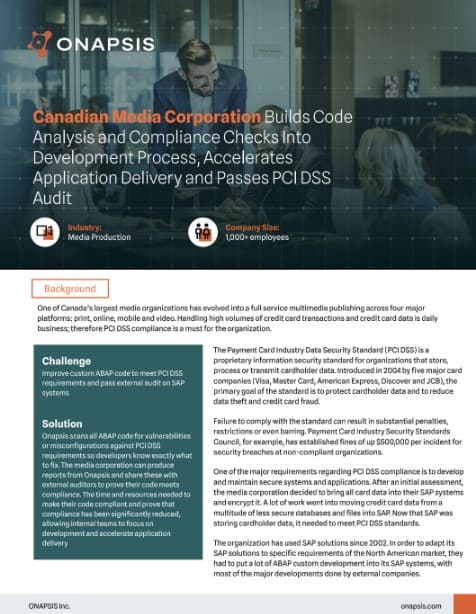Industry – Media Production
Company Size – 1000+ employees
Customer Profile
As one of Canada’s largest multimedia organizations, handling high volumes of credit card data is a daily part of business, making PCI DSS compliance a critical requirement. To meet this standard, the company needed a way to achieve automated compliance
for a massive volume of custom ABAP code within its SAP systems. They partnered with Onapsis to automate SAP code analysis, which was essential for passing their external audit and accelerating application delivery.
The Challenge: Proving PCI DSS Compliance for Custom ABAP Code
After consolidating all credit card data into their SAP systems, the company’s applications became subject to the rigorous Payment Card Industry Data Security Standard (PCI DSS). With a large volume of custom code developed over many years, much of it by external partners, they faced several key challenges:
- Lacking a fast or reliable way to scan all their custom ABAP code for vulnerabilities that would violate PCI DSS requirements.
- Needing to produce clear, actionable reports for developers to fix any compliance issues found in the code.
- Facing a time-consuming and resource-intensive external audit process to prove their SAP systems were compliant.
The Solution: Automated Code Scanning and Compliance Reporting
The media corporation chose the Onapsis Platform as its solution to automate the entire process of analyzing code and proving compliance.
Automated PCI DSS Code Analysis
Using the platform’s code analysis capabilities, the company was able to automatically scan all of its custom ABAP code specifically against PCI DSS requirements. The platform identified the exact issues that needed to be fixed and provided actionable remediation guidance, allowing developers to quickly bring the code into compliance.
Streamlined Audit Reporting
Onapsis enabled the team to easily produce detailed reports and documentation on the state of their code. These reports were shared directly with external auditors, significantly reducing the time and resources needed for the audit process and providing definitive proof of compliance.
The Results: A Successful Audit and Accelerated Development
By building Onapsis into their development process, the company not only passed its PCI DSS audit but also made its entire development lifecycle more efficient and secure.
Results at a Glance:
- Passed the PCI DSS audit by proving custom ABAP code was secure and compliant.
- Automated the identification of security and compliance risks in custom code.
- Significantly reduced the time and resources required for audit preparation.
- Accelerated application delivery by building compliance checks directly into the development process.
A Blueprint for SAP Compliance and Audits
This media company’s success provides a clear model for meeting high-stakes compliance mandates like PCI DSS. Their key to success was automating code analysis and reporting. Key takeaways for your organization include:
- Automate code scanning against specific compliance frameworks (like PCI DSS, SOX, or GDPR) to find issues fast.
- Provide developers with actionable guidance to accelerate remediation and reduce rework.
- Generate comprehensive reports to streamline external audits and prove compliance.
A Blueprint for SAP Compliance and Audits
This media company’s success provides a clear model for meeting high-stakes compliance mandates like PCI DSS. Their key to success was automating code analysis and reporting. Key takeaways for your organization include:
- Automate code scanning against specific compliance frameworks (like PCI DSS, SOX, or GDPR) to find issues fast.
- Provide developers with actionable guidance to accelerate remediation and reduce rework.
- Generate comprehensive reports to streamline external audits and prove compliance.

